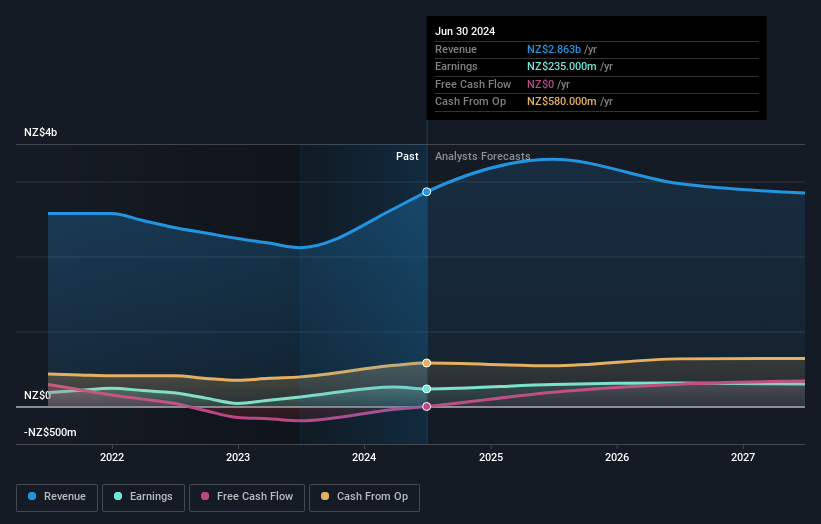- New Zealand
- /
- Electric Utilities
- /
- NZSE:CEN
Retail investors who hold 57% of Contact Energy Limited (NZSE:CEN) gained 3.0%, institutions profited as well

Key Insights
- The considerable ownership by retail investors in Contact Energy indicates that they collectively have a greater say in management and business strategy
- 41% of the business is held by the top 25 shareholders
- Insiders have been buying lately
A look at the shareholders of Contact Energy Limited (NZSE:CEN) can tell us which group is most powerful. The group holding the most number of shares in the company, around 57% to be precise, is retail investors. Put another way, the group faces the maximum upside potential (or downside risk).
While retail investors were the group that reaped the most benefits after last week’s 3.0% price gain, institutions also received a 42% cut.
In the chart below, we zoom in on the different ownership groups of Contact Energy.
Check out our latest analysis for Contact Energy

What Does The Institutional Ownership Tell Us About Contact Energy?
Many institutions measure their performance against an index that approximates the local market. So they usually pay more attention to companies that are included in major indices.
Contact Energy already has institutions on the share registry. Indeed, they own a respectable stake in the company. This suggests some credibility amongst professional investors. But we can't rely on that fact alone since institutions make bad investments sometimes, just like everyone does. It is not uncommon to see a big share price drop if two large institutional investors try to sell out of a stock at the same time. So it is worth checking the past earnings trajectory of Contact Energy, (below). Of course, keep in mind that there are other factors to consider, too.

Contact Energy is not owned by hedge funds. BlackRock, Inc. is currently the company's largest shareholder with 6.1% of shares outstanding. Meanwhile, the second and third largest shareholders, hold 6.0% and 4.8%, of the shares outstanding, respectively.
A deeper look at our ownership data shows that the top 25 shareholders collectively hold less than half of the register, suggesting a large group of small holders where no single shareholder has a majority.
While studying institutional ownership for a company can add value to your research, it is also a good practice to research analyst recommendations to get a deeper understand of a stock's expected performance. There are plenty of analysts covering the stock, so it might be worth seeing what they are forecasting, too.
Insider Ownership Of Contact Energy
The definition of company insiders can be subjective and does vary between jurisdictions. Our data reflects individual insiders, capturing board members at the very least. Management ultimately answers to the board. However, it is not uncommon for managers to be executive board members, especially if they are a founder or the CEO.
Most consider insider ownership a positive because it can indicate the board is well aligned with other shareholders. However, on some occasions too much power is concentrated within this group.
Our most recent data indicates that insiders own less than 1% of Contact Energy Limited. It's a big company, so even a small proportional interest can create alignment between the board and shareholders. In this case insiders own NZ$50m worth of shares. Arguably, recent buying and selling is just as important to consider. You can click here to see if insiders have been buying or selling.
General Public Ownership
The general public, who are usually individual investors, hold a substantial 57% stake in Contact Energy, suggesting it is a fairly popular stock. This level of ownership gives investors from the wider public some power to sway key policy decisions such as board composition, executive compensation, and the dividend payout ratio.
Next Steps:
I find it very interesting to look at who exactly owns a company. But to truly gain insight, we need to consider other information, too. Consider risks, for instance. Every company has them, and we've spotted 1 warning sign for Contact Energy you should know about.
Ultimately the future is most important. You can access this free report on analyst forecasts for the company.
NB: Figures in this article are calculated using data from the last twelve months, which refer to the 12-month period ending on the last date of the month the financial statement is dated. This may not be consistent with full year annual report figures.
New: AI Stock Screener & Alerts
Our new AI Stock Screener scans the market every day to uncover opportunities.
• Dividend Powerhouses (3%+ Yield)
• Undervalued Small Caps with Insider Buying
• High growth Tech and AI Companies
Or build your own from over 50 metrics.
Have feedback on this article? Concerned about the content? Get in touch with us directly. Alternatively, email editorial-team (at) simplywallst.com.
This article by Simply Wall St is general in nature. We provide commentary based on historical data and analyst forecasts only using an unbiased methodology and our articles are not intended to be financial advice. It does not constitute a recommendation to buy or sell any stock, and does not take account of your objectives, or your financial situation. We aim to bring you long-term focused analysis driven by fundamental data. Note that our analysis may not factor in the latest price-sensitive company announcements or qualitative material. Simply Wall St has no position in any stocks mentioned.
About NZSE:CEN
Contact Energy
Generates and sells electricity and natural gas in New Zealand.
Fair value second-rate dividend payer.


